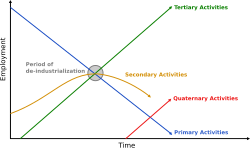Three-sector hypothesis
The Three-sector hypothesis is a large-scale economic type theory. It says that there are three kinds of economic activities, which are very different from each other:
- The extraction of raw materials
- Manufacturing goods
- Providing services
These kinds of activities are called economic sectors. The theory speaks about the primary, secondary, and tertiary sector. The theory was developed by Alan Fisher,[1] Colin Clark[2] and Jean Fourastié[3] in the 1930s. Clark used a speech given by Sir William Petty, in 1690.[4] For this reason the theory is also known as Petty's Law.[5] The first sector is about directly using natural resources, the second sector is about processing these resources to obtain "higher level" goods.
The theory also says that the main focus of the economy of a country will change, from the primary to the secondary, and from the secondary to the tertiary sector, as economic development progresses.
Three-sector Hypothesis Media
This figure illustrates the percentages of a country's economy made up by different sector. The figure illustrates that countries with higher levels of socio-economic development tend to have less of their economy made up of primary and secondary sectors and more emphasis in tertiary sectors. The less developed countries exhibit the inverse pattern.
References
- ↑ Fisher A: The clash of progress and security. Macmillan, London 1935
- ↑ Clark C: The conditions of economic progress. Macmillan, London 1940
- ↑ Fourastié J: Le Grand Espoir du XXe siècle. Progrès technique, progrès économique, progrès social. Presses Universitaires de France, Paris 1949
- ↑ Petty W: Political Arithmetick or a Discourse Concerning, The Extent and Value of Lands, People, Buildings: Husbandry, Manufacture, Commerce, Fishery, Artizans, Seamen, Soldiers; Publick Revenues, Interest, Taxes, Superlucration, Registries, Banks, Valuation of Men, Increasing of Seamen, of Militia's, Harbours, Situation, Shipping, Power at Sea, &c. As the same relates to every Country in general, but more particularly to the Territories of His Majesty of Great Britain, and his Neighbours of Holland, Zealand, and France. London 1690
- ↑ Murata Y: Engel's law, Petty's law, and agglomeration. In: Journal of Development Economics 87 (2008): 161-177


